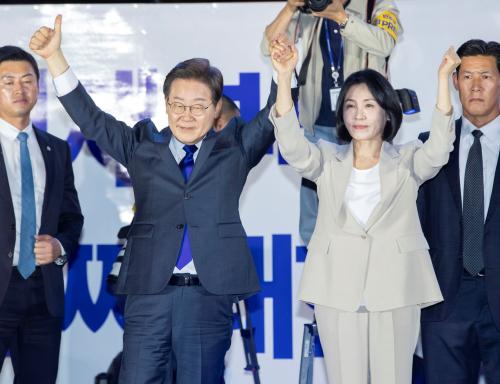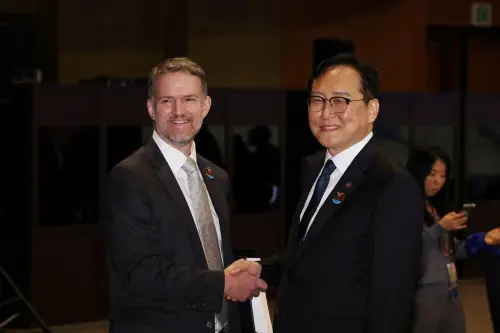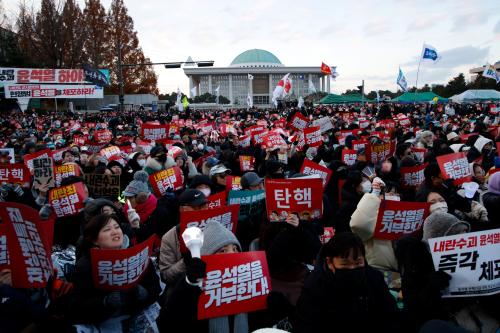

8:30 am EST - 9:45 am EST
Past Event
On November 16, 2021, the Center for East Asia Policy Studies at the Brookings Institution convened a group of experts from the United States and South Korea for the first workshop in a series to assess South Korea’s role in the new geoeconomics and its implications for U.S.-South Korea relations and South Korea’s economic diplomacy in Asia. The theme of this first workshop was regional economic architecture and supply chain resilience.
The workshop opened with framing remarks provided by two experts who offered analysis from the points of view of South Korea and the United States. Dukgeun Ahn, professor of international trade law and policy and dean of international affairs at Seoul National University, observed that the U.S.-Korea Free Trade Agreement (KORUS), now nearing a decade since coming into force, is in need of an update as soon as possible for South Korea to maintain a modern economic relationship with the United States, accommodate new paradigms in trade, and align South Korea with new global standards. Digital trade, an important evolution in the international trade landscape since KORUS, could be a starting point for an update.
Speaking on mega trade agreements, Ahn highlighted that while there is deep diplomatic importance to South Korea signing onto the Regional Comprehensive Economic Partnership (RCEP) in 2020, joining the Comprehensive and Progressive Trans-Pacific Partnership (CPTPP) presents more potential economic benefits to South Korea and the accession process would prepare it for future trade issues. Although talk of joining the CPTPP have been ongoing for years, South Korea’s longtime fraught relationship with CPTPP member Japan is at its lowest point in years, creating a disincentive for the South Korean government to risk public disapproval. Upcoming South Korean elections in March 2022 and potential domestic opposition to CPTPP accession have also affected the calculus of the South Korean government.
On the topic of supply chains, Ahn explained that South Korea is in a precarious position of balancing investment in China with economic engagement with the U.S. and other countries. This balancing act will be especially challenging in sectors affected by U.S.-China supply chain decoupling, such as semiconductors and electric vehicle (EV) batteries. The South Korean government is struggling to straddle two increasingly separate tech ecosystems, and decoupling from the Chinese market would have severe economic costs in the short term.
Wendy Cutler, vice president of the Asia Society Policy Institute, concurred that certain aspects of KORUS were outdated as the trade landscape has changed significantly since it was first signed. She noted that KORUS helped upgrade the U.S.-South Korea relationship by adding an economic pillar to the bilateral alliance. Additionally, South Korea became an important economic partner to the U.S. in Asia-Pacific Economic Cooperation (APEC), the World Trade Organization, and the G-20. While a modernized KORUS would in theory benefit both signatories, Cutler noted the numerous political challenges ahead that in her view precluded renegotiation. Some of the likely American demands (such as rules of origin on autos and additional agriculture market access) could prove very challenging for South Korea. Therefore, trade diplomats should be pragmatic in their approach to addressing new developments, perhaps by channeling discussions through joint committee groups and moving toward softer obligations.
Cutler noted that South Korea may have taken more of a leadership role in pushing RCEP forward since it had remained on the sidelines of TPP and CPTPP negotiations. However, she agreed with Ahn on the desirability of South Korea in joining CPTPP. In the past, several factors have impeded South Korea from entering negotiations including, but not limited to trade fatigue with the U.S. due to contentious KORUS negotiations; a focus on negotiating a free trade agreement with China at the time; and the transfer of trade responsibilities from the Ministry of Foreign Affairs to the Ministry of Trade, Industry and Energy. With the United Kingdom on track to join the CPTPP, and China and Taiwan each expressing interest in joining, questions loom over how the CPTPP structure will evolve with new members, and whether South Korea should be next in line to join the CPTPP as Seoul remains further ahead of China, and possibly Taiwan, in meeting accession requirements.
Following these framing remarks, participants engaged in a group discussion, with much of the conversation focused on the U.S.-South Korea economic partnership. Most participants agreed that an update to KORUS is necessary to address changes in the international trading environment. However, many participants concurred that due to existing political realities, any changes to KORUS through a formal renegotiation process would be painful. The U.S. is likely to make difficult requests and South Korea faces a change in presidential leadership in 2022. In addition, participants remarked that trade is a highly sensitive issue in South Korea. It also appears to be a weak point of the Biden administration. Many agreed that a careful, creative approach is needed to update KORUS that possibly involves less formal mechanisms to advance a modernized U.S.-South Korea trade agenda. However, underlying tensions in EV battery subsidies, market access and surcharges for content streaming, and other areas might present complications.
Reframing the issues and roles of players will be a necessary step in advancing a modernized trade agenda. One participant called for the United States to reevaluate South Korea’s contributions beyond the security component by examining its economic engagement with other Asian countries. Another participant suggested focusing the conversation on securing supply chains via collective efforts. Another suggestion was to pursue reciprocal investment by the U.S. and South Korea which could help build trust in certain sensitive sectors such as semiconductors, mitigate public discontent, and develop state of the art technology.
There were different views among participants on the significance of RCEP. One view was that the diplomatic significance of the partnership outweighs the economic benefits to its members. A different take was that the economic benefits of RCEP should not be dismissed and that the U.S. is missing an opportunity for much-needed engagement on the trade front in the Asia-Pacific by not joining regional trade agreements.
Several participants emphasized the importance of South Korea joining the CPTPP. One participant expressed that the CPTPP could be a launching point for updating KORUS if both countries were to join the partnership. However, in addition to South Korea’s complicated relationship with Japan, agriculture and autos will remain as major hurdles to South Korea joining the CPTPP. South Korea would need to abolish its tariffs on Japanese cars, and drastic agricultural liberalization would be required. Although some doubt was expressed over whether South Korea could overcome these hurdles, one participant remarked that by demonstrating its readiness to meet CPTPP obligations, South Korea might create opportunities for multilateral engagement given the frayed South Korea-Japan bilateral relationship.

Andrew Yeo
June 3, 2025

Andrew Yeo
May 20, 2025

Andrew Yeo, Evans J.R. Revere, Hanna Foreman
April 28, 2025